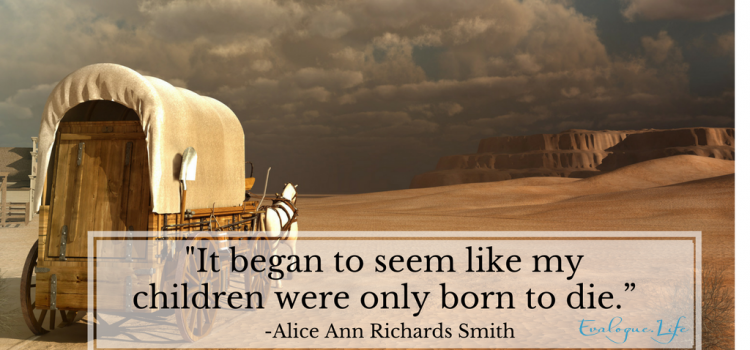
This is an embarrassment of riches. That’s what I thought when I looked around my leaking and smallish camp trailer while reading the pioneer story pulled from a research stack I had brought into the woods. The experience that follows touched me deeply, and I wanted to write a Pioneer Day article about remembering and showing gratitude.
This experience made me ask the question:
“What would my pioneer ancestors say to me?”
As context, my little family drove to Glacier National Park, through such heavy rains we had to stop on the highway; we couldn’t see the road. When we set up camp, we discovered that the trailer’s roof was leaking all over our beds. Ugh. My husband took duct tape/bailing twine measures to stop drips that night, and we discussed whether we should repair and keep it, or repair and sell it when we got home. Either way, we’d have to sink some money, and either decision would be fine because it had cost very little to buy it in the first place. We had loved it well, and that trailer didn’t owe us anything.
But as I did some pioneer research later in the week, I became immersed in the story below, and all at once I saw my circumstances through a new lens. Here is the story of Alice Ann Richards Smith, who is not a part of my family but who I have grown to love just the same.
The Pioneer Story of Alice Ann Richards Smith
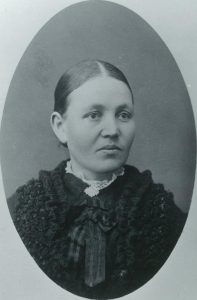
Alice Ann Richards was born in a covered wagon parked in a spot that is now City Creek Mall in Salt Lake City. You can see the approximate spot today because there is a marker in the sidewalk labeled Richards Street, named for her father. The day she was born was a blizzard in 1849, just after her family vacated the Old Fort (now Pioneer Park). Her petite mother Nanny Lynn Longstroth was just 21 years old, and a wife to Willard Richards. (As historic context related to the Mormon pioneer era, Willard Richards was a first cousin and good friend of Brigham Young. He served as church Historian and first Editor of the Deseret News and had been the private secretary to Joseph Smith. Richards was one of the men present in Cartahage Jail when Joseph Smith was shot.)
Related article: Ancestral homes – how to research the story of a home or building
Back to Alice Ann. At the time she was born, the family was so poor that her mother and mother’s sister Sarah had only one good dress and one good layette set to share between them. The two sisters alternated wearing the dress in public and using the layette set as needed. There were grateful to have that much.
Can you imagine giving birth in a covered wagon that you are using as your home? They had been living in a crude cabin in the Old Fort, but the adobe structures had started to collapse with spring storms, and Brigham Young decided it was time for everyone to fan out into the valley. They left without having a new home or cabin built, so they took up residence in their covered wagon.
So they lived with only canvas between them and the elements until they could build a cabin. No building materials were purchased from Home Depot. No groceries could be picked up. After months of crossing the plains, no warm bath or savory meal greeted them in the Salt Lake Valley. They faced more hard labor to scratch an existence from the sagebrush.
Alice Ann’s story was not unique. I have ancestors who spent a winter living in a dugout with snakes and mice in Ephraim. Theirs was a comparative luxury during the first winter there, which was especially harsh. Others had pooh-poohed the idea of living underground but then almost froze to death in their covered wagons that winter. Livestock froze in place.
Another set of ancestors spent the first year huddled in a dugout carved from the banks of the Bear River. Mud dripped on their heads every time it rained.
I cannot begin to imagine.
There is more to Alice Ann’s story. As a girl, when Johnston’s Army was on the move in 1857, the entire Wasatch Front was evacuated. They filled their homes with sticks and straw, ready to be burned if soldiers entered the valley before an agreement was reached. Their trees had only begun to bear fruit, and here they faced leaving again. As the young Alice Ann gathered sticks as fuel to torch their home, the story goes that she said “My sticks will not burn, for they are too wet with tears.”
Related article: An Orphan’s Pioneer Story
Around that time, Lot Smith became famous for being sent with a ragtag band of frontiersmen to harass the Army, thereby buying time for a settlement to be reached. They stalled the Army, which faced a brutal Wyoming winter. War was averted. Back in Utah, tattered families returned to their homes the next spring.
When Alice Ann came of age, she became a plural wife to Lot Smith.
Their union had wonderful promise, but not long into it they were sent by Brigham Young to settle in Arizona. Her girlish dreams met a sweltering landscape and the stark realities of being a plural wife.
My eyes filled with tears when I read this from her Arizona journal, “I was beginning to think my children were only born to die.” Her family was living in an unforgiving part of Arizona (Sunset) where her husband had been asked to lead a settlement that was doomed to fail. They lived what was called The United Order, a communal structure which meant everything Alice Ann owned now belonged to the collective. When her family sent a baby blanket from Utah for the birth of her child, it was given to another family whose baby was born first. She took it on the chin, but private hurts like that accumulated.
Those were just the small hurts. Arizona took four of her nine children. One boy drowned crossing the Little Colorado River, one toddler was scalded when he toppled the lye soap vat, and two died at about a year old. Childhood disease was a cruel thief in those days.
By the time she was my age, Alice Ann got word that one of her sons had typhoid fever at college in Provo, Utah and wasn’t expected to make it. His roommate had already passed away so she grabbed her children and chased time to Utah. She had no money, but she happened to cross paths with her husband on the way. He had just sold some animals and had money on his person which paid for her train fare. They parted, expecting that she would return, but she never did. The fates next brought a mix of blessings and more heartaches.
First the blessings. Her son recovered and at the same time, her father’s estate was settled. This gave her enough money to purchase a farm of her own. She bought land and a small farm in Fielding, Utah sight unseen because she had brothers there. As a plural wife for twenty-some years, living the failed United Order experiment, she now had a real home of her own. She described that period as the happiest time of her entire life.
Her husband made one visit with another of his wives in tow, but within a year, he was shot by an Indian in Arizona. He’d had friendly relations with the local tribe before that, but conflicts were inevitable as white settlers crowded onto lands once openly used by indigenous people. Alice Ann’s youngest son Albert (Pinto) Smith would never know his father.
By age 41 Alice Ann Richards had borne 9 children and buried 4 of them. She had been a plural wife for decades, and now lost her husband. The “happiest time of her life” was in the middle of establishing a homestead from scratch and living in a home that her grandchildren described as having walls so thin the winter winds came right through. At least it wasn’t a covered wagon.
Yet, through the hardship, she was always considered a lady. She had received a top-notch education for the day, and possessed a keen intellect. She was a woman of faith, of stimulating conversation, and of grit. One grandson described her as “the most loving person I had ever met,” although another grandchild added, “I never saw her smile.”
I’d lose my smile too if I had to grieve six of my nine children. Only three of her children outlived her.
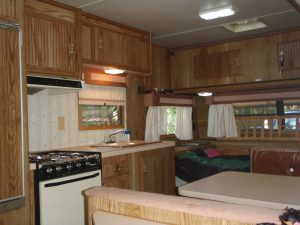
Luxurious Camping
I read all this while sitting on a memory-foam cushion atop a queen-sized bed in our cozy trailer. The cabinets were stocked with hamburger buns and marshmallows. The fridge was full of bacon and apple juice. We had dishes, paper towels, and soap that we purchased – not made from an enormous vat of lye and lard, a vat like the one that took Alice Ann’s little boy. Warm water streamed from the trailer’s tap on demand, a little toilet was right inside, and it even had a shower spigot if we were inclined. A propane-powered furnace kicked on if the temperature dropped, and if I needed power for my laptop, we just started the generator. Our truck had hauled us 700 miles for the sheer pleasure of vacation. And after the roof leaked, my husband drove into town the next day and purchased a roll of sticky vinyl to cover the roof, keeping us dry the rest of the trip. The engineering and quality of materials in our “economical” camp trailer was astounding.
Related article: Pioneer Stories Help us Work Harder
What would the ancestors say?
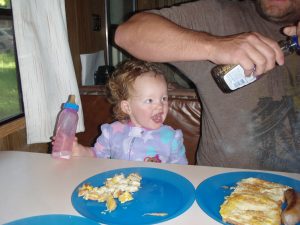
Alice Ann, if we could visit together, what would you say to me? Would you scold me for being a spoiled brat? Or would you tell me to enjoy these blessings with my whole being? Would you remind me to clutch my baby? When I get cranky about my husband, would you tell me to stop being such a whiner and appreciate this man who does so much around the house? Maybe you’d say all of this at once.
An answer also whispered into my heart that Alice Ann and my own ancestors would tell me to look at my family and to see that, “these are your riches.”
We can’t know for sure what the dead would say, but on this Pioneer Day, I would like to tell Alice Ann and my own ancestors who laid the bricks for my comfortable life something:
“Thank you. Your stories remind me that I can do hard things. I am doing my best to remember, and I hope to honor your name.”
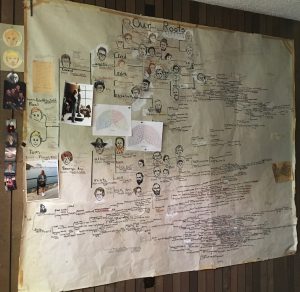
And in case you wonder if Alice Ann’s own family honors her, enjoy this photo (above). I snapped this photo in her granddaughter’s home. It is the best genealogy chart I have ever seen because of how personal it is. This chart has been up for decades, with only first names to make each ancestor more approachable. It has hand drawings. Enjoy!
Related article: My Uncanny Discoveries and a Prayer that Preceded Them

Rhonda Lauritzen is the founder and an author at Evalogue.Life – Tell Your Story. Rhonda lives to hear and write about people’s lives. She believes that when you tell your story, it changes the ending. She and her husband Milan restored an 1890 Victorian in Ogden. She especially enjoys unplugging in nature. She recently completed the history of the Old Fort where Pioneer Park now sits, a project commissioned by Salt Lake City. Check out her books: How to Storyboard, and Every Essential Element. She was also the writing coach of bestselling author, Rob A. Gentile, who wrote Quarks of Light, A Near-Death Experience: What I Saw That Opened My Heart
Subscribe!

Get our weekly email with tips to tell your story and the Sunday Edition. (Free, of course)


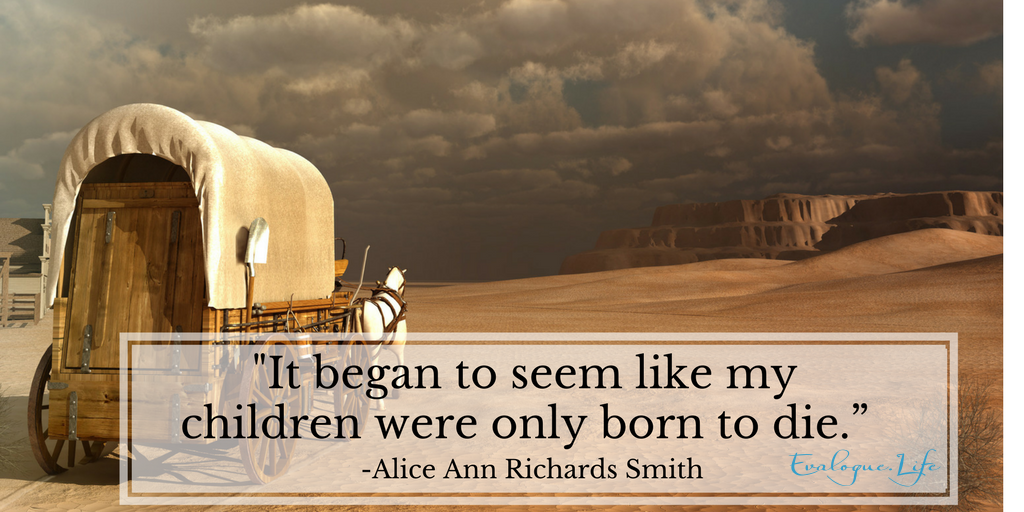


Pingback: How do pioneer stories affect you? They make a great impact.
What a beautiful experience. I, too, had a similar one during a cross-country move when I felt especially sad about leaving friends and family and a home and place I adored. I kept having thoughts of my own ancestors crossing the country and how I had hotels and food at every exit, how I was going to an apartment while we house-hunted. I began to feel guilty about all my tears and felt a little ashamed that my ancestors left everything for nothing except their faith (which was everything, really). The thought that came to my mind was, “Oh, honey, this IS hard.” Yes, I had comforts, but it didn’t minimize the pain of leaving things I loved behind. I really appreciated what they had done. I loved the additional connection I felt. And I, too, had an ancestor who lived in a covered wagon for a while! Thanks for this beautiful article.
Thank you, Jennifer. You totally get it! It seems like a balance between being grateful for all we have, all the comforts, and not being spoiled brats. At the same time, leaving family/friends behind and making changes is hard no matter what the circumstances. Human emotions haven’t changed much, it seems, and we still experience the same types of feelings they did.
Thank you so much for writing this article. My mom shared it with me on Facebook. Alice Ann Richards is my Great, Great Grandmother. I have grown up listening to stories about her from my Grandma. She loved and respected her so much. Growing up we made a memorial day trip to Alice Ann’s burial place in Fielding. We would also go by her home in Fielding. I learned a lot from your article that I either didn’t know or have forgotten. Thank your for this treasure!
Kerri, I am delighted that you are a descendant of Alice Ann Richards and that you found this story. What a proud heritage you have to come from her line. She is not a blood relative of my own, but she inspires me a great deal and I have come to love her. It pleases me that you were reminded of details about her and that this article might add to the legacy of her life.
My mother’s name was Ann Alice Smith Nebeker.
Her grandmother was Alice Ann Kimball Smith.
Her mother was Ann Alice Gheen Kimball
Her grandmother was Alice Ann Atkins Gheen.
My son just named his little girl Alice Roselyn Diamond.
So, I was particularly interested in this story of Alice Ann Richards Smith, who I wondered had any relation to my long string of Alice Ann’s and Ann Alice’s. I loved this story and appreciate the sacrifices these strong women made for us. It is something we don’t want to ever forget.
Thank You!
Catherine DIamond
How lovely to have a new little girl named Alice after such a line of strong women. Hmm, I wonder if there really is any connection to your Alice Ann and to ours or if it was just a common name at the time? I say this because we often find interconnections we didn’t expect to find. Thank you for your comment Catherine. The fact that you took a minute means a lot to us. (By the way, we would have responded right away but this comment got embedded in with other SPAM and we just saw it today).